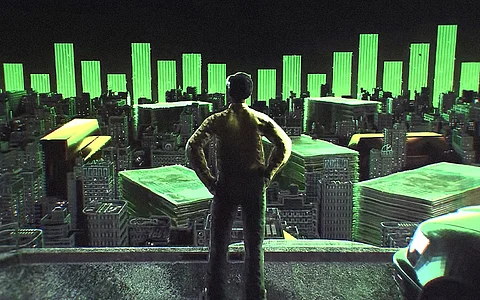
- Reviews
- Power List 2024
- Cannes 2024
- In-Depth Stories
- Web Stories
- News
- FC Lists
- Interviews
- Features
- FC SpecialsFC Specials

Film score or background music has always been a critical element of movies; a good background score aids in the narration of the story, adds depth to characters, enhances an actor's performance and helps convey emotions without the need for any dialogue, making the viewer's experience more enjoyable.
Most of us would find it next to impossible to dissociate the background score from some of the most iconic moments in films. Be it the 'Imperial March' theme from Star Wars encapsulating Darth Vader's power or the wonder one felt in Welcome to Jurassic Park, as we open up to the mesmerising visuals of the dinosaurs from the first Jurassic Park movie. There are a thousand examples of how such background scores have helped elevate great scenes to iconic Status.
While background scores have been an essential part of most movies in the International cinema, one can't say the same about Indian movies, excluding some notable exceptions. In the Indian context, music has traditionally been associated with visual songs and not particularly with background music. However, recent years have seen an increased emphasis on developing an engaging background score for movies, as well as TV shows.
This increased emphasis has also led to deeper and more engaging storytelling. Think of the rocking Goa soundtrack from Dil Chahta Hai, which may not be as popular as many of the film's other tracks but perfectly captured the vibe of the now-iconic Goa trip from the movie. The same goes for the scene in Swades where a kid is selling tea at a railway station, accompanied by a moving score of the film's title track, or Shah Rukh Khan's thrilling skydiving escape scene from Farhan Akhtar's Don. All of these moments were perfectly aided by a captivating background score that elevated the engagement we had with the scene.
Indian film music has evolved with time and due emphasis is now placed on the development of a score that isn't just there to stitch two scenes together or to be a cool musical track on the album but is recognised as an invaluable tool that helps move the story forward in several meaningful ways. The 'World record 175*' score in 83, from when Ranveer Singh's Kapil Dev breaks the world record, brilliantly emphasised the sheer accomplishment and importance of his innings. The goosebump-worthy background scores of historical epics Tanhaji and Padmaavat provided heft to the impressive action scenes. More recently, Kamal Hassan-starrer Vikram boasted of a fantastic background score for almost every major character in the film, enhancing the already thrilling movie experience.
The trend is also not just limited to movies — several TV Shows such as Scam 1992, The Family Man, and Rocket Boys have effectively leveraged background scores — whether it is to ramp up the dramatic tension or depict a character's growing sense of confidence. The score for Scam 1992, in fact, became such a nationwide rage that it may have indirectly even contributed to the success of the show.
The Indian music industry hosts amazing talent that has delivered excellent music over the years. With makers now focussing more on background scores, old as well as newer composers such as Achint Thakkar or Anirudh Ravichander are delivering brilliant pieces. The focus on background scores is a relatively new and welcome one and I, for one, hope the trend continues and gains further momentum in the time to come.